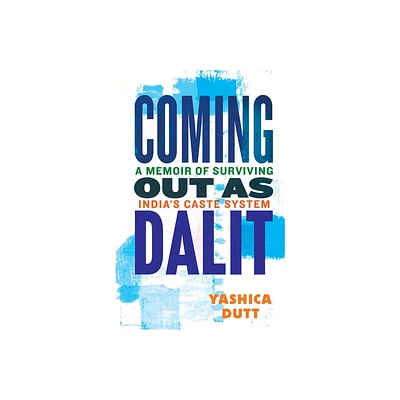Home
Coming Out as Dalit: A Memoir of Surviving India's Caste System (Updated Edition)
Loading Inventory...
Barnes and Noble
Coming Out as Dalit: A Memoir of Surviving India's Caste System (Updated Edition)
Current price: $28.00


Barnes and Noble
Coming Out as Dalit: A Memoir of Surviving India's Caste System (Updated Edition)
Current price: $28.00
Loading Inventory...
Size: Audiobook
*Product Information may vary - to confirm product availability, pricing, and additional information please contact Barnes and Noble
For readers of
Caste
, the coming-of-age story of a Dalit individual that illuminates systemic injustice in India and its growing impact on US society
“A moving personal story and a useful educational examination of persistent discrimination”—
Kirkus Reviews
Winner of the Sahitya Akademi Yuva Puruskar, 2020
Born into a “formerly untouchable manual-scavenging family in small-town India,” Yashica Dutt was taught from a young age to not appear “Dalit looking.” Although prejudice against Dalits, who compose 25% of the population, has been illegal since 1950, caste-ism in India is alive and well. Blending her personal history with extensive research and reporting, Dutt provides an incriminating analysis of caste’s influence in India over everything from entertainment to judicial systems and how this discrimination has carried over to US institutions.
Dutt traces how colonial British forces exploited and perpetuated a centuries-old caste system, how Gandhi could have been more forceful in combatting prejudice, and the role played by Dr. B. R. Ambedkar, whom Isabel Wilkerson called “the MLK of India’s caste issues” in her book
. Alongside her analysis, Dutt interweaves personal stories of learning to speak without a regional accent growing up and desperately using medicinal packs to try to lighten her skin.
Published in India in 2019 to acclaim, this expanded edition includes 2 new chapters covering how the caste system traveled to the US, its history here, and the continuation of bias by South Asian communities in professional sectors. Amid growing conversations about caste discrimination prompting US institutions including Harvard University, Brandeis University, the University of California system, and the NAACP to add caste as a protected category to their policies, Dutt’s work sheds essential light on the significant influence caste-ism has across many aspects of US society.
Raw and affecting,
Coming Out as Dalit
brings a new audience of readers into a crucial conversation about embracing Dalit identity, offering a way to change the way people think about caste in their own communities and beyond.
Caste
, the coming-of-age story of a Dalit individual that illuminates systemic injustice in India and its growing impact on US society
“A moving personal story and a useful educational examination of persistent discrimination”—
Kirkus Reviews
Winner of the Sahitya Akademi Yuva Puruskar, 2020
Born into a “formerly untouchable manual-scavenging family in small-town India,” Yashica Dutt was taught from a young age to not appear “Dalit looking.” Although prejudice against Dalits, who compose 25% of the population, has been illegal since 1950, caste-ism in India is alive and well. Blending her personal history with extensive research and reporting, Dutt provides an incriminating analysis of caste’s influence in India over everything from entertainment to judicial systems and how this discrimination has carried over to US institutions.
Dutt traces how colonial British forces exploited and perpetuated a centuries-old caste system, how Gandhi could have been more forceful in combatting prejudice, and the role played by Dr. B. R. Ambedkar, whom Isabel Wilkerson called “the MLK of India’s caste issues” in her book
. Alongside her analysis, Dutt interweaves personal stories of learning to speak without a regional accent growing up and desperately using medicinal packs to try to lighten her skin.
Published in India in 2019 to acclaim, this expanded edition includes 2 new chapters covering how the caste system traveled to the US, its history here, and the continuation of bias by South Asian communities in professional sectors. Amid growing conversations about caste discrimination prompting US institutions including Harvard University, Brandeis University, the University of California system, and the NAACP to add caste as a protected category to their policies, Dutt’s work sheds essential light on the significant influence caste-ism has across many aspects of US society.
Raw and affecting,
Coming Out as Dalit
brings a new audience of readers into a crucial conversation about embracing Dalit identity, offering a way to change the way people think about caste in their own communities and beyond.










![Coming Out [Blu-ray]](https://prodimage.images-bn.com/pimages/0688187004532_p0_v2_s600x595.jpg)







